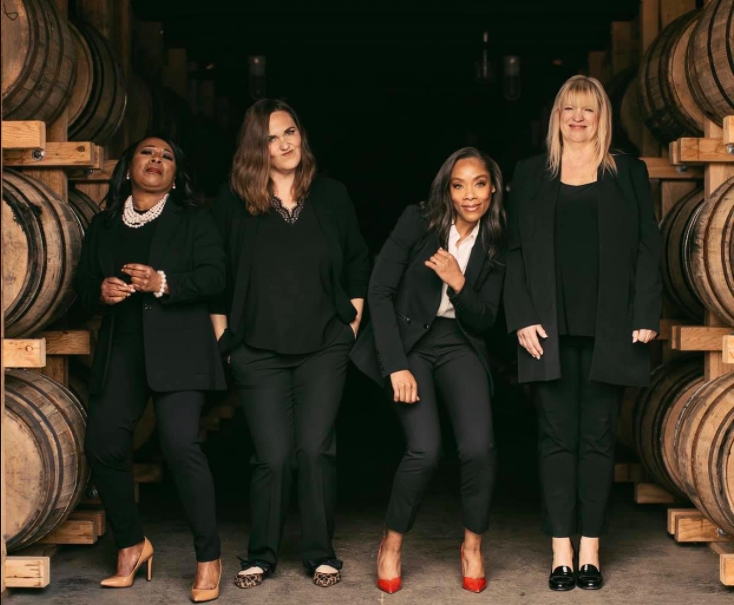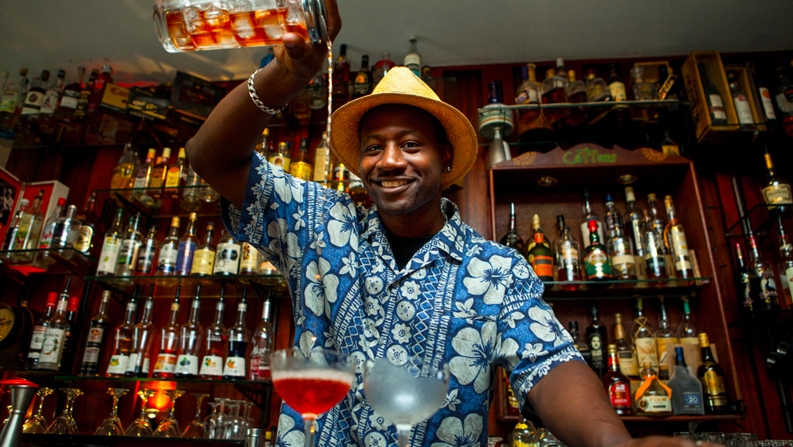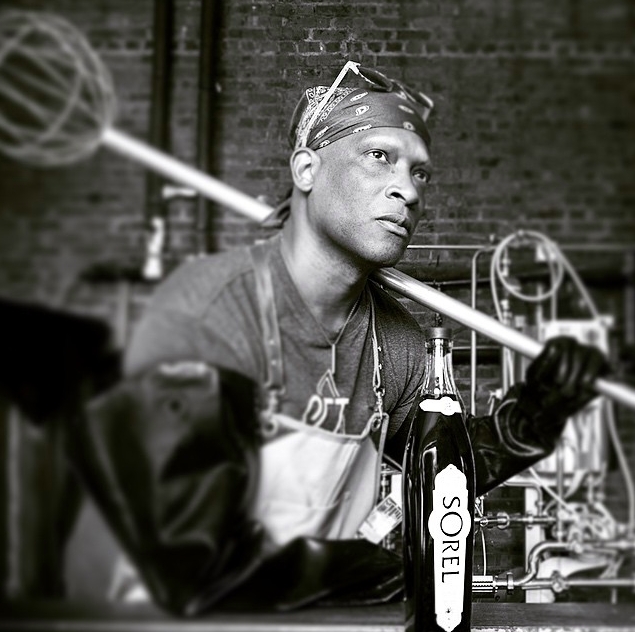
Fawn Weaver has been upending the American spirits industry, in general, and Tennesee whiskey, in specific, since 2017. Weaver, a former financial investor, got into the distilling game after partnering with one of the whiskey world’s most important legacy holders: The Green family. Uncle “Nearest” Green was the distiller who actually created the famous Jack Daniel’s Tennessee whiskey all those years ago. His ingenuity and craft shaped the way Tennessee whiskey tastes to this day and his decedents became a cornerstone of the industry right up until Prohibition.
Weaver’s rise in the spirits industry has always been in pursuit of championing Black, Indigenous, and People of Color (BIPOC) and female voices. Even before a single bottle of Uncle Nearest whiskey hit shelves, Weaver was already sending Green’s descendants to college so they could pursue their dreams. Once Uncle Nearest the brand became a reality, its CEO kept it all in the family by employing Nearest Green’s direct descendent, Victoria Eady Butler, as her brand’s Master Blender. She also made sure the leadership of her whiskey company was both minority and female-driven — something that’s all too rare.
Then came the awards, the glowing press, and all the laurels that come with releasing some of the best Tennessee whiskey in the game. It made for a hell of a story and an incredibly exciting ride, but Weaver was far from finished. Last spring, she partnered with Jack Daniel’s for the Nearest & Jack Advancement Initiative — helping educate whiskey’s next generation of distillers, blenders, and leaders. Now, Weaver has taken that investment a step further, founding the Uncle Nearest Venture Fund which has earmarked $50 million to support minority-owned spirits brands.
This week, I spoke with Weaver about the fund’s first two recipients (Equiano Rum and the Sorel Liqueur made by Jack from Brooklyn), and what motivates her to take on changing the whole damn spirits industry from the ground up.

Can you walk us through the evolution from Uncle Nearest to what you’re doing now with this new $50 million spirits fund?
It’s funny, for me it feels like a natural evolution. We follow the path of “how do we create diversity in this industry that reflects America as we know it.”
So, when I walk into a room of distributors and every single one is a white male with the exception of two white females, then we know we’ve got a problem. All you have to do is go to a few industry-related events here to discover that we have a diversity problem.
But the thing is I’m not wired to focus on the problem. It’s of zero interest to me. I’m wired to focus on the solution. And because I’m always focused on solutions, then one solution leads to another solution that leads to another.
We began with the Nearest & Jack [Daniels] and the Nearest Green School of Distilling and working with the president of Motlow State College to try to create a pipeline. But the problem with that is that that’s all later down the line. We knew it would take a couple of years to get through the accreditation process and that’s even pushing the state of Tennessee to get it done. And then you’ve got at least a few more years before you really truly have people in the pipeline.
The leadership acceleration program is sort of the microwave version of getting people of color into leadership positions because we’ve not been in leadership positions for so long, and it’s clear that the industry isn’t really set up properly to elevate people of color. You’ve got to set some gasoline on the fire to get that going!
But that’s only scratching the surface, right?
The challenge with that is we were putting all of our efforts around one brand to really create a model of success down the road. But then we started getting calls, emails, and reach-ins from all these other black businesses that — if someone did not support them pretty soon — were going to go out of business.
We began helping every single one that reached out, if they were actually already in the market. If they reach out to us with just an idea … we don’t have time for ideas. We have the ability to help them if they’re already working. We’ve gotten so many of them distribution by just utilizing our connections. With that, we’ve been able to help these Black businesses. Then, they could go out and raise capital.
Here’s the problem with raising capital though. In America, the problem with raising capital is you have all of these companies that these founders will pitch to. But the reality is that investors — and I’ve been an investor for a long time and I do the same thing — do not really invest in products. They invest in people. They invest in the founders. So the challenge is, if a founder does not have a connection, they’re going to be pitching all over the place and they’re just going to keep hearing, “no.” And that’s not because their product isn’t great, but because there is no way for that investment firm to validate this founder.
So you really need a connection. So the question became, “Okay, I’m helping them with these business plans, but who are they going to pitch and who’s actually going to fund them?”
Right. It feels like with the success of Uncle Nearest, you’re in a position to direct money in the right places.
Right. At the same time that I was grappling with how to best help black founders to be able to raise money, I was turning down money every single day. Literally, every day. I don’t remember the last time a day went by where there wasn’t some major investor in my email box, cold calling, hoping that Uncle Nearest would be willing to receive some type of investment.
I literally get DMs on my Instagram and Facebook from investors. I get it on LinkedIn. I get it on email every day. And my response had to be truncated down to, “No, thank you.” Then, I realized that at the same time I’m trying to figure out how to help these guys raise money, I’m turning down money every day in my own company.
So, I decided I would circle back to some of the people I turned down and say, “Hey, Uncle Nearest is still not a viable investment for you because I don’t plan on raising money again. I’m done. But I am going to set out to create or help develop the next Uncle Nearests in this industry.”
And what is the litmus for that brand to be the “next” Uncle Nearest?
That means really fast-growing. There has to be a brand story that the press will love talking about. It can’t sound like the same old story they’ve been telling for the last 100 years. You know the story, It’s some white dude with a field whose great, great, great grandfather… etc. There are stories that are interesting to people at this point that also don’t sound like a regurgitation of everything that came in the past. Those things are very important.
Another aspect was finding a founder that isn’t trying to build to flip. I have zero interest in helping people build just to sell. If that’s the case, we end up in the same place we started because the only people buying are white males. All of the large conglomerates are owned by white males. So if I help you to build your brand as a person of color or as a woman, and then you just sell it, we’re back at square one again.

What drew me into this story is when I heard you invested in an old friend of mine, Ian Burrell’s Equiano Rum. What about that story grabbed your attention?
Listen — it is the best brand story next to Uncle Nearest. Period. During the powerful movements taking place last summer, where we were all recognizing that Black people have been systematically oppressed and there was just no way of turning a blind eye anymore, there was an awakening all at the same time around the world.
And one of the names that kept coming up, in terms of giving a statue when all these other statutes were toppling overseas was Equiano. I didn’t know anything about him. And then I learned from Ian that he was coming out with a rum. Now, Ian has impressed me from the moment I met him at an Uncle Nearest event in London and he described himself as the global rum ambassador. And I was like, “What does that even mean?” So, when I discovered that he loved rum so much, that he didn’t want to represent a single brand, and instead went to all of the brands and created this position out of thin air to represent all of the brands, I knew he was someone special.
I knew that if he ever decided to found his own brand, it was going to be one of the best rums in the world. And I knew he was going to absolutely be brilliant in marketing it.
As you said, investors invest in people.
I knew immediately that I wanted to be first in line to invest. So, when I see the press come out for Equiano, I reached out to him. I kid you not, he will confirm this, I said, “When is your next raise? I want the entire round.” It was like, “I don’t want a piece of the round. What’s next? Series A? I want the whole round. When are you doing series B? I want the whole round.” That was the conversation. And that was before I knew the story and of Equiano. I just knew that whatever he was going to put out was going to be excellent and at the level of Uncle Nearest.
Ian really nailed the story too.
When he told me this story of Olaudah Equiano, and how he’s coming out of Africa and sold into slavery to a family in Barbados where he makes this rum that is so incredible. Then comes back to London … So, then Ian decided to make his rum by taking 20 percent of rum from Barbados and blending it with 80 percent of rum coming out of Mauritius, so Africa then bringing it back to London to share it with the world… The idea that they were following Equiano’s actual life journey and his fight for not only his own freedom but the freedom of all enslaved people through legislation and his writings… I got chills.
I still get chills every time I tell that story. And the only other story I get chills from is when I tell the story of Uncle Nearest.

I’d love to talk about Ian the whole day, and I’m sure he’d love that too, but we have to talk about your other main investment — Jack from Brooklyn’s and Sorel, which is a liqueur.
Jackie [Summers] founded the first black-owned distillery, post-prohibition, in America. Quite frankly, it’s hard for us to know whether or not there were any black-owned, legal distilleries prior to prohibition. When Jackie started in 2012, there were no other Blacks in the industry and he got beat up really, really badly. That usually happens, even though his product is absolutely phenomenal. But he’s a Black bald dude who wears a scarf, who’s buff, strong, and coming out of Brooklyn. So he’s got that Brooklyn toughness. And that doesn’t necessarily play well in the boardroom where you have to try to raise money from all white guys.
Here’s the thing about Sorel, it’s phenomenal. It is hands down my favorite liqueur, nothing comes close. I love St-Germain. I love Domaine de Canton. I always have them in my home bar. But neither one of them is lower than the halfway mark. I went through a bottle of Sorel in a weekend!
I put it in my whiskey. I put it in my rum. I put it in my champagne. I was like, “is there anything it doesn’t go with?” But here’s the crazy part, my favorite way to drink Sorel is neat. I have never tasted a liqueur that I wanted to drink by itself.
It’s a brilliant liqueur for sure.
Stellar. Plus, his backstory is amazing. But I’ll tell you what really drew me to Jackie. Jackie has this super tough exterior, and that’s what people see. But all you have to do is spend any amount of time with him away from the confines of the industry and he is one of the most kind-hearted and gentle people I’ve ever met in my life. I realized that his lack of funding has everything to do with the fact that people just didn’t know what to do with him. I think they can’t get past the tough exterior. Once I got past that, I was like, “okay, I am going to fund this” because it’s the best liqueur on the market, period. For me, there’s no question and I will take a Sorel spritzer over an Aperol spritzer any day of the week and twice on Sunday.
So once I learned that it has not gotten funding and it hadn’t been in the market for years but was still talked about by bartenders and spirits people all the time to this day — which said that that spirit left an indelible mark on this industry and that the entire industry was rooting for it to come back. So I look at it as such an honor and privilege to even be able to be a part of bringing that back into the industry because I think it did a disservice to the industry for it to be taken away.
I wholeheartedly agree. A Sorel Manhattan is one of my favorite drinks so I was very excited to hear it’s coming back and excited for Jackie as well. One last question: I feel like it’d be very easy for you to rest on your laurels after the success of Uncle Nearest. You’ve won the awards. You’ve won the respect of the industry. You could have been like, “Okay, I’m good. I’m just going to enjoy my life on the farm, enjoy my whiskey, and that’s that.” What has driven you to become a driving force for something bigger and better in the spirits industry?
I think you have to remember how the brand came to be to really understand that story. Uncle Nearest was never a money play for me, ever. I am still one of the lowest-paid full-time employees of the company and intend to stay that way because it is more important to me what I put in than what I take out.
But even before the first bottle of Uncle Nearest was ever sold, we were already putting kids through college with the Nearest Green Foundation by paying for his descendants to go to college. For us, it started off with really helping the entire lineage of the Nearest Green family because his children and his grandchildren were, for the most part, entrepreneurs.
At the time, they were wealthy for Black Americans, for sure, thanks to the whiskey business. Then Prohibition hit and, remember, Prohibition lasted ten years longer in Tennessee than anywhere else in this country. They were the first going into before federal Prohibition started and then they were the last ones to come out. Jack Daniel’s distillery was closed for almost 40 years. That’s an entire generation of Green descendants who were then removed from the industry. So by the time the next generation came, they’d all, for the most part, moved to Nashville or Indiana or St. Louis and they had different lives, different careers. They’d all moved on.
Even today, the three Green family members who are back at Jack Daniel’s are all working in the bottling house or warehouse. None of them are on the distilling side. None of them are in leadership. When I met Nearest’s descendants — the high schoolers and college-aged kids — it was very clear that they didn’t realize they came from a legacy of excellence. I wanted to bring that back to that family.
So that’s where this all began. That’s how we built all of this. It has always been very purpose-driven. This is abnormal for the industry because the way that we’re doing stuff is more like we’re a nonprofit. I don’t know when we’ll ever turn a profit because we keep putting all the money back into giving back. But that’s been our purpose from day one.
I think it’s why we don’t really have turnover in our company, why our team members absolutely love working for Uncle Nearest, because we all feel like we’re working towards something much bigger than us. The $50 million fund is a natural evolution, so don’t be surprised if a $250 million fund follows it. Because we’re not going to rest. We’ve got a very unique opportunity to actually diversify an entire industry and then to be used as a lighthouse for how the other industries that look similar to ours can start to diversify their own.
I don’t look at this as being something that’s limited to just spirits. I think that we are going to have a great impact on every single industry in America. So there is no time for sitting on our laurels.
